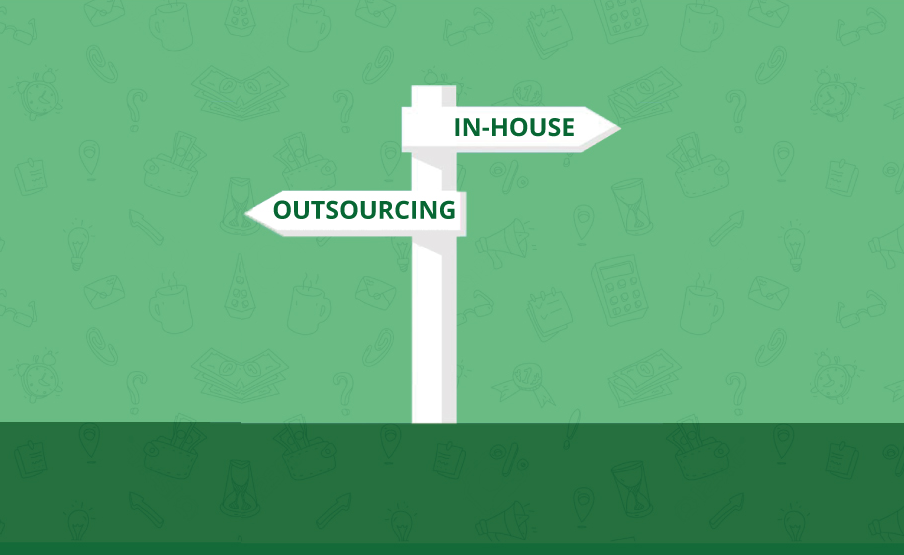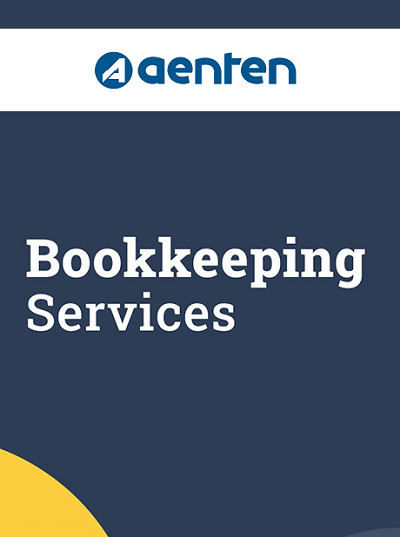Accounting is an integral part of every business, ensuring accurate financial record-keeping, compliance with regulations, and informed decision-making. As businesses grow and expand, the question of whether to outsource accounting functions or keep them in-house becomes increasingly relevant. Both outsourcing and in-house accounting have their unique advantages and disadvantages, and the choice between the two depends on various factors such as company size, financial resources, expertise, and specific business needs.
In this guide we explore the key differences between outsourced accounting and in-house accounting, providing insights into the benefits and drawbacks of each approach. By understanding the intricacies of both options, businesses can make informed decisions that align with their financial objectives, operational efficiency, and long-term goals.
I. What is Outsourced Accounting?
A. Definition and Scope:
Outsourced accounting, also known as outsourced bookkeeping or external accounting, involves entrusting a third-party accounting firm or professional to manage financial tasks and processes on behalf of a business. These external accounting professionals provide a range of services, from basic bookkeeping to complex financial analysis and reporting, depending on the business’s needs. The scope of outsourced accounting can be tailored to match the specific requirements of each company, offering a cost-effective and flexible solution.
B. Functions Outsourced in Accounting:
Outsourced accounting services can encompass a wide array of financial tasks, including:
- Bookkeeping: Recording financial transactions, maintaining general ledgers, and reconciling accounts.
- Financial Reporting: Generating financial statements such as balance sheets, income statements, and cash flow statements.
- Payroll Processing: Calculating employee wages, taxes, and benefits, as well as managing payroll taxes and compliance.
- Accounts Payable and Receivable: Managing invoices, payments to vendors, and collections from customers.
- Tax Preparation and Compliance: Ensuring accurate tax calculations, filing tax returns, and adhering to tax regulations.
- Financial Analysis: Providing insights into financial performance, profitability, and cash flow management.
C. Types of Outsourced Accounting Services:
There are various types of outsourced accounting services available, catering to the diverse needs of businesses:
- Full-Service Outsourced Accounting: Comprehensive accounting services covering all financial functions required by the business.
- Partial Outsourced Accounting: Selective outsourcing of specific accounting functions, such as payroll processing or tax preparation.
- Virtual CFO Services: Engaging experienced financial professionals to provide strategic financial guidance and support.
- Cloud-Based Accounting Solutions: Utilizing cloud-based accounting software for real-time access and collaboration with the outsourced team.
D. Benefits of Outsourced Accounting:
- Cost Savings: Outsourcing accounting functions can be more cost-effective than hiring full-time in-house accountants, especially for small and medium-sized businesses.
- Access to Expertise: Outsourced accounting firms have specialized professionals with in-depth knowledge and experience in financial management.
- Time Efficiency: External accountants handle time-consuming financial tasks, allowing business owners and managers to focus on core operations.
- Scalability: Outsourced accounting services can scale according to the business’s needs, accommodating growth or seasonal fluctuations.
- Latest Technology: Outsourced accounting firms often use advanced accounting software and technology, ensuring accurate and efficient financial management.
E. Drawbacks of Outsourced Accounting:
- Communication Challenges: Maintaining effective communication with external accountants may require extra effort due to geographical distance or time zone differences.
- Data Security Concerns: Businesses must carefully select reputable accounting firms to ensure the confidentiality and security of sensitive financial data.
- Dependency on Third-Party: Relying on external accountants means the business may have less direct control over the accounting processes.
II. What is In-House Accounting?
A. Definition and Scope:
In-house accounting, also known as internal accounting, refers to the practice of managing financial tasks and processes within the organization using in-house accounting staff. Businesses hire or employ accountants or accounting teams to handle financial record-keeping, analysis, and reporting. In-house accountants are integrated into the company’s daily operations and work directly with other departments and stakeholders.
B. Responsibilities of In-House Accountants:
In-house accountants take on various financial responsibilities, including:
- Bookkeeping: Recording daily financial transactions and maintaining accurate accounting records.
- Financial Reporting: Preparing periodic financial statements and management reports for decision-making.
- Budgeting and Forecasting: Assisting in the development of budgets and financial forecasts.
- Payroll Management: Calculating employee salaries, taxes, and benefits and ensuring payroll compliance.
- Financial Analysis: Analyzing financial data to provide insights on business performance and profitability.
C. Advantages of In-House Accounting:
- Direct Control: Having an in-house accounting team allows for direct oversight and control over financial processes.
- Immediate Communication: In-house accountants can quickly collaborate with other departments to address financial queries and concerns.
- In-Depth Knowledge: Internal accountants gain a deeper understanding of the business’s financial nuances and industry-specific requirements.
- Data Confidentiality: With the data retained within the organization, there may be reduced concerns about data security.
D. Challenges of In-House Accounting:
- Hiring and Training: Recruiting and training skilled accountants can be time-consuming and costly.
- Overhead Costs: Maintaining an in-house accounting team incurs expenses such as salaries, benefits, and office space.
- Limited Expertise: In-house accountants may not possess specialized skills required for complex financial matters.
III. Key Differences: Outsourced Accounting vs. In-House Accounting
A. Cost Considerations:
1. Outsourced Accounting:
- Often more cost-effective for small and medium-sized businesses due to reduced overhead costs and access to shared resources.
- Businesses pay for services on an as-needed basis, avoiding the expenses of hiring full-time accountants.
2. In-House Accounting:
- Involves higher overhead costs, including salaries, benefits, and infrastructure for the in-house accounting team.
- Fixed costs are incurred regardless of fluctuations in accounting needs.
B. Expertise and Skillsets:
1. Outsourced Accounting:
- Provides access to specialized accounting professionals with expertise in various financial domains.
- External accountants may possess broader industry experience, bringing valuable insights to the business.
2. In-House Accounting:
- Allows for in-depth knowledge of the company’s operations and specific industry requirements.
- In-house accountants can be trained to understand the unique financial needs of the business.
C. Data Security and Confidentiality:
1. Outsourced Accounting:
- Requires careful selection of reputable and trustworthy accounting firms to ensure data security.
- Businesses must establish robust data sharing protocols and confidentiality agreements with the outsourced team.
2. In-House Accounting:
- Offers greater control over data confidentiality as sensitive financial information remains within the organization.
- Businesses can implement stringent security measures to protect financial data.
D. Flexibility and Scalability:
1. Outsourced Accounting:
- Offers flexibility to scale accounting services based on the business’s changing needs and growth trajectory.
- Ideal for businesses experiencing seasonal fluctuations or rapid growth.
2. In-House Accounting:
- May be less flexible in accommodating fluctuations in accounting demands without incurring additional hiring costs.
- Well-suited for businesses with stable accounting needs.
E. Communication and Control:
1. Outsourced Accounting:
- Communication may require additional effort due to geographical separation or time zone differences.
- Businesses must establish effective communication channels to maintain transparency and collaboration.
2. In-House Accounting:
- Facilitates immediate communication and collaboration between the accounting team and other departments.
- Offers direct control and supervision over financial processes.
F. Customization and Personalization:
1. Outsourced Accounting:
- External accounting firms can tailor services to meet specific business requirements, providing customized solutions.
- Businesses can choose from various service packages based on their needs.
2. In-House Accounting:
- Enables a deeper understanding of the company’s financial processes and the ability to customize practices to align with the business’s culture.
G. Compliance and Regulatory Requirements:
1. Outsourced Accounting:
- Accounting firms are responsible for staying updated on changing accounting regulations and ensuring compliance.
- External accountants can provide expertise in navigating complex regulatory requirements.
2. In-House Accounting:
- Requires continuous training to keep in-house accountants informed about changing regulations.
- Businesses must ensure internal compliance and implement effective internal control measures.
IV. Factors Influencing the Decision
A. Business Size and Complexity:
The size and complexity of the business play a crucial role in determining the most suitable accounting approach. Small businesses may find outsourcing cost-effective and efficient, while larger companies with complex financial transactions and reporting requirements may prefer in-house accounting for better control and customization.
B. Financial Resources and Budget:
The available financial resources and budget significantly impact the decision between outsourcing and in-house accounting. Smaller businesses with limited budgets may find outsourcing more affordable, while larger companies may have the financial capacity to maintain an in-house accounting team.
C. Industry and Sector Specificities:
Different industries and sectors have varying accounting needs and regulatory requirements. Outsourced accounting firms with industry-specific expertise can provide tailored services to address these unique requirements effectively. However, businesses with highly specialized accounting demands may prefer in-house accountants who can develop an in-depth understanding of their sector.
D. Growth and Expansion Plans:
Businesses with ambitious growth and expansion plans may prefer outsourcing to accommodate changes in accounting needs without incurring additional hiring costs. On the other hand, companies with stable growth may choose in-house accounting for better control and alignment with long-term objectives.
E. Geographical Considerations:
Outsourcing accounting to firms in different geographical locations can introduce time zone challenges, affecting real-time communication. Businesses with operations in multiple locations may prefer outsourcing, while those with a centralized presence may lean towards in-house accounting.
F. Internal Resources and Capacity:
The availability of internal resources and expertise can influence the decision. Companies lacking accounting expertise or staff may find outsourcing advantageous. In contrast, businesses with skilled accountants already in place may opt for in-house accounting to leverage their internal capabilities.
G. Risk Tolerance and Liabilities:
The level of risk tolerance and liability concerns may also guide the choice. Outsourcing reduces potential liabilities associated with in-house employment, but businesses must ensure that external accounting firms are trustworthy and compliant with data security protocols.
V. Pros and Cons: Outsourced Accounting and In-House Accounting
A. Pros of Outsourced Accounting:
- Cost Savings: Outsourcing can be more cost-effective, particularly for small and medium-sized businesses.
- Access to Expertise: External accountants bring specialized skills and industry knowledge.
- Time Efficiency: Outsourced accounting frees up time for business owners and managers to focus on core operations.
- Scalability: Outsourced services can adjust to the business’s changing needs and growth trajectory.
- Latest Technology: Accounting firms often utilize advanced software and technology for efficient financial management.
B. Cons of Outsourced Accounting:
- Communication Challenges: Maintaining effective communication with external accountants may require extra effort.
- Data Security Concerns: Selecting reputable accounting firms is critical to ensure data security and confidentiality.
- Dependency on Third-Party: Businesses may have less direct control over accounting processes.
C. Pros of In-House Accounting:
- Direct Control: Businesses have direct oversight and control over financial processes.
- Immediate Communication: In-house accountants can quickly collaborate with other departments.
- In-Depth Knowledge: Internal accountants gain a deeper understanding of the business’s financial nuances.
D. Cons of In-House Accounting:
- Hiring and Training: Recruiting and training skilled accountants can be time-consuming and costly.
- Overhead Costs: Maintaining an in-house accounting team incurs additional expenses.
- Limited Expertise: In-house accountants may not possess specialized skills required for complex financial matters.
VI. Case Studies: Success Stories of Outsourced Accounting and In-House Accounting
A. Company A: The Benefits of Outsourcing Accounting Services
Company A is a startup in the tech industry. With limited financial resources and a focus on rapid growth, Company A decided to outsource its accounting functions. By partnering with an experienced accounting firm, Company A gained access to a team of skilled professionals without the burden of hiring and training in-house accountants. The accounting firm provided timely financial reports and insights, enabling Company A’s management to make informed decisions. Moreover, outsourcing allowed Company A to remain flexible and scale accounting services as the company expanded its operations. The cost savings from outsourcing allowed the business to allocate resources to core activities, contributing to its overall success.
B. Company B: The Advantages of In-House Accounting
Company B is a well-established manufacturing company with a complex financial structure. Due to the industry’s specific accounting requirements and the company’s preference for direct control, Company B chose to maintain an in-house accounting team. The in-house accountants developed a deep understanding of the company’s financial operations, allowing them to provide tailored financial analysis and forecasts. The immediate communication between the accounting team and other departments facilitated efficient decision-making and streamlined financial reporting. Company B valued the in-house team’s expertise and believed that their in-depth knowledge contributed significantly to the company’s strategic growth.
VII. Conclusion:
The decision between outsourced accounting and in-house accounting is a critical one that significantly impacts a company’s financial management and operational efficiency. Both approaches offer unique advantages and disadvantages, and businesses must carefully evaluate their specific needs, financial resources, and long-term objectives to make an informed choice.
Outsourced accounting provides cost savings, access to expertise, and scalability, making it an attractive option for smaller businesses and startups seeking external support. However, businesses should be diligent in selecting reputable accounting firms to address data security concerns.
In-house accounting offers direct control, personalized solutions, and in-depth knowledge of the business’s financial nuances. It is often favored by larger companies with stable accounting needs and the financial capacity to maintain an internal team.
Ultimately, the optimal choice depends on the company’s size, industry-specific requirements, growth plans, budget, and risk tolerance. By thoroughly assessing these factors and considering the pros and cons of both approaches, businesses can make a well-informed decision that aligns with their financial goals and contributes to their overall success.






